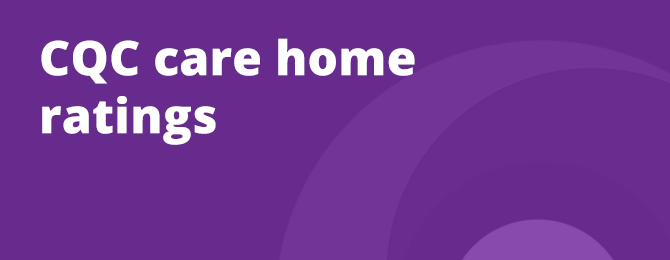CQC care home ratings

Contents
- What is the CQC?
- How does the CQC rate care homes?
- What does the CQC inspect?
- How often are care homes inspected?
- How to access CQC ratings
- What do CQC ratings mean for you?
What is the CQC?
The Care Quality Commission (CQC) is the independent regulator of health and social care services in England. Its mission is to ensure that care homes and other healthcare providers meet high standards of safety and quality. The CQC carries out inspections and publishes reports to help people make better-informed decisions about care services.
How does the CQC rate care homes?
The CQC rates care homes based on a set of key criteria, providing an overall rating that reflects the quality of care. The ratings are designed to be clear and easy to understand, giving you a snapshot of how well a care home performs.
Rating scale
The CQC uses four main ratings for care homes:
- Outstanding: The care home provides exceptional care and exceeds expected standards.
- Good: The care home meets expected standards and delivers quality care.
- Requires Improvement: The care home has areas that need improvement to meet quality standards.
- Inadequate: The care home does not meet required standards and needs significant improvement.
These ratings help you quickly gauge the quality of care provided and make more informed choices.
What does the CQC inspect?
The CQC inspects care homes across five key areas to assess their performance:
Safe
The inspection evaluates how well the care home keeps its residents safe from harm. This includes checking:
- Health and safety measures: Are risks managed effectively?
- Staffing levels: Is there adequate staff to provide safe care?
- Medication management: Are medications handled and administered correctly?
Effective
This area focusses on whether the care provided leads to positive outcomes for residents. Inspectors look at:
- Care plans: Are they tailored to meet individual needs?
- Nutrition and hydration: Are residents receiving appropriate food and drink?
- Treatment and care: Are residents receiving care based on best practices?
Caring
The CQC assesses whether the care provided is compassionate and respectful. Key aspects include:
- Dignity and respect: Are residents treated with kindness and respect?
- Emotional support: Are residents supported emotionally and socially?
- Involvement: Are residents involved in decisions about their care?
Responsive
This area checks how well the care home responds to the needs and preferences of residents. Inspectors consider:
- Personalised care: Are residents' preferences and needs met?
- Complaints handling: How are complaints managed and resolved?
- Activities and engagement: Are there meaningful activities available?
Well-led
The CQC examines how well the care home is managed and led. This includes:
- Leadership and management: Is there effective leadership in place?
- Staff training: Are staff properly trained and supported?
- Quality assurance: Are there systems to monitor and improve care?
How often are care homes inspected?
Care homes are typically inspected annually, although the frequency can vary based on the care home's rating and performance. Homes rated as "Outstanding" may be inspected less frequently, while those rated as "Requires Improvement" or "Inadequate" may face more regular checks to ensure they are making necessary improvements.
How to access CQC ratings
You can access CQC ratings and inspection reports on the CQC website. Simply search for the care home by name, location, or postcode to find the latest inspection report and rating. This information is valuable for:
- Choosing a care home: Compare ratings to find a high-quality care home.
- Monitoring care quality: Stay informed about the performance of the care home.
Search for a care or nursing home on the CQC website
What do CQC ratings mean for you?
Understanding CQC ratings can help you make more informed decisions about care homes. Here's how:
For families
If you're looking for a care home for a loved one, CQC ratings provide crucial insights into the quality of care. A higher rating often indicates better overall care, but it's also important to read the inspection report for detailed information about the care home's strengths and areas for improvement.
For example:
- If a care home has an "Outstanding" rating, it generally means that the home provides exceptional care and excels in all inspection areas.
- Conversely, a rating of "Inadequate" suggests serious issues that need addressing, which could be a red flag.
For potential residents
If you're considering moving into a care home, reviewing CQC ratings can help you select a facility that meets your personal care needs and standards. It's also a good idea to visit the care home in person and talk to current residents and their families to get a feel for the environment and care provided.
Is the information correct?
Let us know if the information on this page is wrong and needs to be updated.
Want to create a page on the Plymouth Online Directory? Register for free and add a page; it only takes a few minutes.




